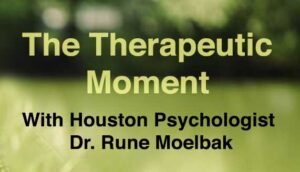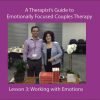Fear and anxiety about being oneself often plays a significant role in people’s relationships. Oftentimes, however, we are not aware that we are holding parts of ourselves back. We have simply adapted to the relationship and learned to be a lesser version of ourselves.
A husband, for example, may not really be aware that he is afraid of speaking his mind to his wife. Fortunately for him his organism has already responded to his fear without him consciously having to be aware of it. He now simply becomes more quiet, goes along with what his wife wants, or tells her what he thinks she wants to hear. His behavior has become a protective mechanism that prevents his anxiety and fear from creeping into his mind and causing conscious anxiety in his body and psyche.
Yet, in the course of therapy, once the husband feels more safe to open up about his thoughts and feelings, he is able to acknowledge that his customary inhibitions really serve to protect him from the risk of a backlash from his wife.
If he really shares his thoughts and feelings, he now acknowledges, his wife might hear an unintended message, or interpret what he says in the wrong way.
Why We Become Afraid to Be Our True Self:
Saying to his wife that he really feels like having some “alone time”, for example, has become dangerous because his wife often responds to this kind of information by feeling wounded and rejected, becoming angry, or shutting down and becoming cold and distant.
This kind of experience by the husband of getting "punished" for sharing his inner thoughts and feelings is painful, and pain tells us to avoid that which causes the pain. Even without the husband consciously being aware of his specific fears about sharing himself with his wife, his body has reacted, and the pain he once felt about getting lambasted or frozen out by his wife, has now given way to an automatic aversion to sharing his thoughts and feelings freely.
The Pain of Disconnection:
This kind of automatic inhibition of who we are and how we think often plays a significant role in the lives of both partners in a relationship. The pain of disconnection is often so aversive to us that we automatically stay away from having certain conversations and sharing certain parts of us, if we believe they will trigger this pain.
The good thing about this kind of avoidance is that we decrease the chance of getting hurt or “punished”, at least in the short term. The bad thing, of course, is that the less we share of ourselves and the more we inhibit our true feelings and thoughts, the more we really become alienated from each other and from ourselves, and the less our relationship can really serve as a safe haven for us to weather life’s storms.
Your Fears Might Be Ruining Your Relationship:
Alienation as a result of too much aversive learning about what not to do and what not to say is often the main reason couples end up coming to couples therapy.
The initial attempt to avoid painful disconnection and criticism from each other often ends up hollowing out the relationship satisfaction and making both partners feel starved for affection and connection.
Although numbing ourselves to certain needs might feel safer in the short-term, it erodes our relationship in the long term.
Something therefore needs be done to actively work against the natural tendency to protect ourselves from short term relationship pain.
Making Your Partner Your Ally:
The fear or anxiety of openly and honestly making ourselves known to our partner needs to be calmed so that steps can be taken to talk about each other’s fears and join forces against them.
Our partner has to become an ally against the fear of disconnection, so that we can take steps to give ourselves more fully to each other.
The only way to accomplish this is to practice talking about our fears, needs, feelings, and thoughts, even when they are not necessarily the same as those of our partner.
What Makes Sharing So Difficult?
What makes this difficult is that the pain-avoidance response in our partner may quickly size up what we say as a danger signal. If we say we need alone time, for example, our partner’s pain avoidance system might get afraid that what we really say is that we don’t like them, that we find them boring, or that we don’t feel that attached.
However, if we realize that we are both prone to misinterpret each other due to our strong aversion to pain, and if we can acknowledge that we need to help each other to approach the fear of pain and work together to combat it as a mutual enemy of the relationship, then there is hope.
Then you might share your pain and fear about me possibly not finding you interesting instead of simply lambasting me or shutting down for already having rejected you. And I may then be able to let you know that I love you, but that I get afraid to share my desire for “alone-time” because I worry that I will lose your affection if I do. Hearing me speak about my need for your affection and my fear of losing it, may then make you less fearful of my alone-time and respond to me without getting angry.
Creating a Positive Cycle:
A positive cycle of sharing our true thoughts and feelings without triggering a painful repercussion has now been set in motion. Sharing now elicits closeness, rather than distance, anger, or sadness. As we can each share more of ourselves with our partner the relationship also begins to feel more spacious and accepting of who we really are. Instead of walking on eggshells or keeping quiet about our needs, we can now turn to each other for support and comfort and feel more comfortable showing our partner who we really are.
We have begun to transcend the dichotomy between self and other and to realize that the more connected we are, the more separate we can be.

























